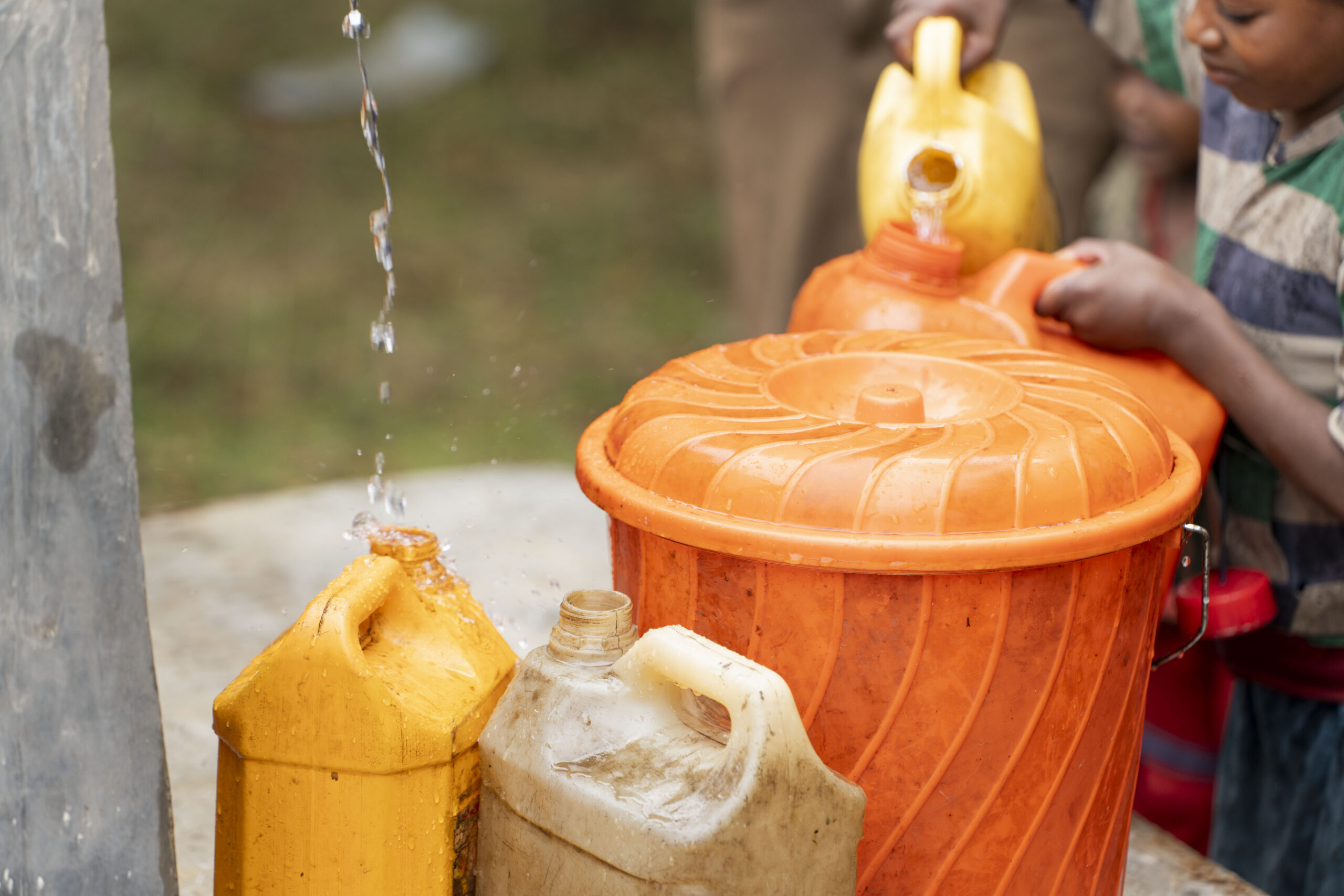COWASH IV in Benishangul Gumuz and Tigray
The COWASH IV project is making significant progress in improving water, sanitation and hygiene (WASH) services in rural Ethiopia. Among the eight regions where the project is working, Benishangul Gumuz and Tigray have been part of the project since its early phases.
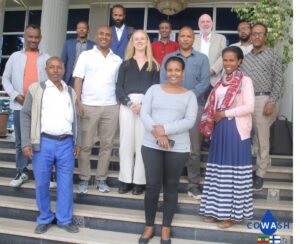 COWASH began operating in Tigray during its first phase in 2011 initially covering the then Ofla and Enda Mokoni Woredas. By its third phase, the project had expanded to seven Woredas. In the post-conflict period, COWASH IV was the first project to bring WASH finance to the region. Following the peace agreement in Tigray, the signing of a Memorandum of Understanding between the Ministry of Finance and the Tigray Bureau of Finance on 02 June 2023 enabled the project to commence work in the region. Recognizing the need for post-conflict recovery, the project focused on rehabilitation and capacity building across the 12 project Woredas now covered.
COWASH began operating in Tigray during its first phase in 2011 initially covering the then Ofla and Enda Mokoni Woredas. By its third phase, the project had expanded to seven Woredas. In the post-conflict period, COWASH IV was the first project to bring WASH finance to the region. Following the peace agreement in Tigray, the signing of a Memorandum of Understanding between the Ministry of Finance and the Tigray Bureau of Finance on 02 June 2023 enabled the project to commence work in the region. Recognizing the need for post-conflict recovery, the project focused on rehabilitation and capacity building across the 12 project Woredas now covered.
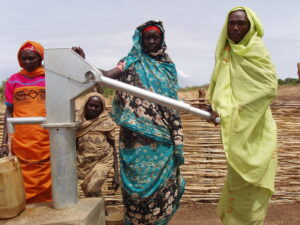
In Benishangul Gumuz, COWASH began work during its Second Phase in 2013, initially covering four woredas. Within a year, the project expanded to include five additional woredas, bringing the total to nine. Currently, COWASH IV operates in four woredas of the region: Bambasi, Oda Bildigilu, Undulu, and Pawe.
Since its launch in these two regions, COWASH IV has facilitated the rehabilitation of 243 community water points, benefiting around 68,346 people. In addition, the project constructed and rehabilitated water points in 24 school and in 6 health facilities. The Project also constructed a school menstrual hygiene management center in Tigray. Aiming to promote sustainable WASH practices, the project has delivered capacity-building training to around 6,148 people in both regions.
By addressing critical WASH needs, COWASH IV is not only improving public health but also empowering communities and fostering sustainable development in rural Ethiopia.
The power of inclusion: Bogalech's Story
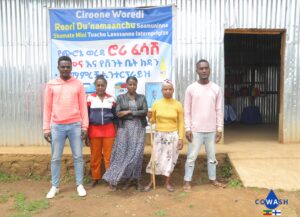 Bogalech Boresamo is one of the first women with disabilities to become a successful entrepreneur in her community.” As a founding member of the Roori Market-Based Sanitation Center in Sidama, Ethiopia, she has been instrumental in the center’s success, ensuring the availability of affordable sanitation supplies for her community.
Bogalech Boresamo is one of the first women with disabilities to become a successful entrepreneur in her community.” As a founding member of the Roori Market-Based Sanitation Center in Sidama, Ethiopia, she has been instrumental in the center’s success, ensuring the availability of affordable sanitation supplies for her community.
Roori, which was successfully launched in April 2024, is a market-based sanitation center (MBSC) in Sidama’s Chrione Woreda (District). It was established by COWASH IV in collaboration with Sidama Regional Government and is engaged in manufacturing and distributing liquid soap (detergent) and improved toilet slabs.
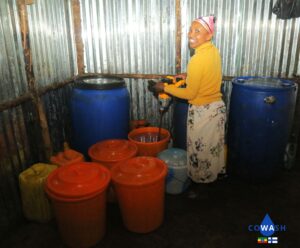 Before joining the center, Bogalech says unemployment was a huge challenge. However, the MBSC has provided her financial independence and a platform to contribute back to her community. Beyond financial stability, the center has empowered Bogalech to dream big. She and her team aspire to expand their business and make a greater impact on public health.
Before joining the center, Bogalech says unemployment was a huge challenge. However, the MBSC has provided her financial independence and a platform to contribute back to her community. Beyond financial stability, the center has empowered Bogalech to dream big. She and her team aspire to expand their business and make a greater impact on public health.
Bogalech highlights the potential of individuals with disabilities stressing everyone has the capacity to work, given the opportunity. She says “as I’ve overcome challenges, others can too. We won’t achieve anything by staying idle. Let’s take action and work towards a better future.” She personally exemplifies this message, demonstrating that a disability need not hinder one’s capacity to work and make a difference. Belaynesh remains committed to the project’s disability-inclusive goals, offering her expertise and support to other areas.
Bogalech’s story is a testament to the power of inclusion and the potential of people with disabilities. Her determination and hard work have not only transformed her life but also inspired others to overcome challenges.

A High-Level Delegation Visits COWASH IV’s Work in Sidama
On November 28, 2024, a high-level delegation from Ethiopia and Finland visited COWASH IV’s community water schemes and school WASH initiatives in Sidama’s Wongo Genet Woreda. The delegation, which included State Minister of Water and Energy Ambassador Asfaw Dingamo (PhD), State Minister of Finance Semereta Sewasew, and members of the Finland Development Policy Committee, witnessed first-hand the impact of the project in rural Ethiopia.
 The delegation visited Edo Kebele, where they observed community water points constructed in collaboration with local communities. Subsequently, the delegation visited Wesha Primary School, where COWASH IV has constructed improved latrines and a Menstrual Hygiene Management Center. The project has also provided educational materials and training on menstrual hygiene management and reusable sanitary pad and underwear production to teachers and students. They engaged with community members, teachers and students to discuss the project’s impact on their lives.
The delegation visited Edo Kebele, where they observed community water points constructed in collaboration with local communities. Subsequently, the delegation visited Wesha Primary School, where COWASH IV has constructed improved latrines and a Menstrual Hygiene Management Center. The project has also provided educational materials and training on menstrual hygiene management and reusable sanitary pad and underwear production to teachers and students. They engaged with community members, teachers and students to discuss the project’s impact on their lives.
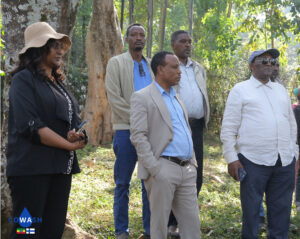 State Minister of Finance Semereta noted the project’s far-reaching impact, stating, “the project not only provided safe WASH services but also has improved the overall quality of life promoting the health and productivity of communities.” Inka Hopsu, a member of the Finnish Development Policy Committee, praised the project’s CMP approach, highlighting its role in ensuring the sustainability of WASH infrastructures. She also noted that the project has particularly benefited women and girls by addressing their needs and empowering them.
State Minister of Finance Semereta noted the project’s far-reaching impact, stating, “the project not only provided safe WASH services but also has improved the overall quality of life promoting the health and productivity of communities.” Inka Hopsu, a member of the Finnish Development Policy Committee, praised the project’s CMP approach, highlighting its role in ensuring the sustainability of WASH infrastructures. She also noted that the project has particularly benefited women and girls by addressing their needs and empowering them.
The delegation’s visit underscores the strong partnership between Ethiopia and Finland and the shared commitment to sustainable development. COWASH IV’s success serves as a model for other WASH initiatives and highlights the importance of empowering communities to take ownership of their WASH infrastructure.
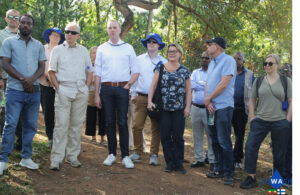
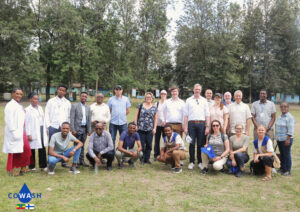


A High-Level Delegation Visits COWASH IV’s Work in Sidama
On November 28, 2024, a high-level delegation from Ethiopia and Finland visited COWASH IV’s community water schemes and school WASH initiatives in Sidama’s Wongo Genet Woreda. The delegation, which included State Minister of Water and Energy Ambassador Asfaw Dingamo (PhD), State Minister of Finance Semereta Sewasew, and members of the Finland Development Policy Committee, witnessed first-hand the impact of the project in rural Ethiopia.
 The delegation visited Edo Kebele, where they observed community water points constructed in collaboration with local communities. Subsequently, the delegation visited Wesha Primary School, where COWASH IV has constructed improved latrines and a Menstrual Hygiene Management Center. The project has also provided educational materials and training on menstrual hygiene management and reusable sanitary pad and underwear production to teachers and students. They engaged with community members, teachers and students to discuss the project’s impact on their lives.
The delegation visited Edo Kebele, where they observed community water points constructed in collaboration with local communities. Subsequently, the delegation visited Wesha Primary School, where COWASH IV has constructed improved latrines and a Menstrual Hygiene Management Center. The project has also provided educational materials and training on menstrual hygiene management and reusable sanitary pad and underwear production to teachers and students. They engaged with community members, teachers and students to discuss the project’s impact on their lives.
 State Minister of Finance Semereta noted the project’s far-reaching impact, stating, “the project not only provided safe WASH services but also has improved the overall quality of life promoting the health and productivity of communities.” Inka Hopsu, a member of the Finnish Development Policy Committee, praised the project’s CMP approach, highlighting its role in ensuring the sustainability of WASH infrastructures. She also noted that the project has particularly benefited women and girls by addressing their needs and empowering them.
State Minister of Finance Semereta noted the project’s far-reaching impact, stating, “the project not only provided safe WASH services but also has improved the overall quality of life promoting the health and productivity of communities.” Inka Hopsu, a member of the Finnish Development Policy Committee, praised the project’s CMP approach, highlighting its role in ensuring the sustainability of WASH infrastructures. She also noted that the project has particularly benefited women and girls by addressing their needs and empowering them.
The delegation’s visit underscores the strong partnership between Ethiopia and Finland and the shared commitment to sustainable development. COWASH IV’s success serves as a model for other WASH initiatives and highlights the importance of empowering communities to take ownership of their WASH infrastructure.



Ethiopia and Finland Celebrated 30 Years of Successful WASH Partnership
 A celebration of the 30th anniversary of Ethiopia and Finland’s successful collaboration in the WASH sector was held on November 27th, 2024 in Hawassa City. The Embassy of Finland in Ethiopia organized the event to commemorate this milestone and the visit of the Finland Development Policy Committee.
A celebration of the 30th anniversary of Ethiopia and Finland’s successful collaboration in the WASH sector was held on November 27th, 2024 in Hawassa City. The Embassy of Finland in Ethiopia organized the event to commemorate this milestone and the visit of the Finland Development Policy Committee.
The event was attended by State Minister of Water and Energy Ambassador Asfaw Dingamo (PhD), State Minister of Finance Semereta Sewasew, Ambassador of Finland to African Union, Ethiopia and South Sudan Sinikka Antila, Sidama Regional State President Desta Ledamo, members of the Finland Development Policy Committee and other invited dignitaries.
A key highlight of the event was the recognition of the 13-year-long effective implementation of the COWASH project as a testament to this successful bilateral partnership. Ambassador Antila praised the project as a “role model for rural WASH in Ethiopia,” highlighting its unique community-managed project (CMP) approach that brought a strong sense of ownership and commitment in beneficiary communities.
 Ambassador Asfaw Dingamo and Semereta Sewasew echoed Ambassador Antila’s sentiments, highlighting the project’s effectiveness and sustainability. They commended COWASH’s significant impact on the lives of millions of rural Ethiopians, improving public health and overall quality of life. Members of the Finnish Development Policy Committee also recognized the significant contributions of the project to rural communities. Since its inception in 2011, COWASH has benefited over 5.5 million rural communities across eight regions.
Ambassador Asfaw Dingamo and Semereta Sewasew echoed Ambassador Antila’s sentiments, highlighting the project’s effectiveness and sustainability. They commended COWASH’s significant impact on the lives of millions of rural Ethiopians, improving public health and overall quality of life. Members of the Finnish Development Policy Committee also recognized the significant contributions of the project to rural communities. Since its inception in 2011, COWASH has benefited over 5.5 million rural communities across eight regions.
In addition to its approach, the project’s success has been attributed to commitment and strong collaboration of the project partners. This, according to Neil Chadder, COWASH IV Chief Technical Advisor, makes COWASH a true testament to bilateral cooperation, emphasizing the remarkable partnership between Finland, Ethiopia, and the communities themselves.
As the celebration concluded, there was a shared optimism for the future of Ethiopia and Finland collaboration. Both sides expressed their commitment to further strengthen their partnership and expand the impact of the COWASH project.
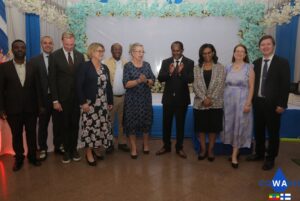
Ethiopia and Finland have a bilateral relationship that dates back to 1959. Their cooperation in the WASH sector began in 1994 with the launch of the Rural Water Supply and Environmental Program (RWSEP). Over the next 17 years, this project improved access to safe water supply in the Amhara Region. In parallel, the FinnWASH project was launched in Benishangul-Gumuz, further expanding the scope of the partnership. Building on the success of these earlier initiatives, the COWASH project, which is now in its fourth phase, was launched nationally in 2011, becoming the heart of this 30 years successful bilateral collaboration.






